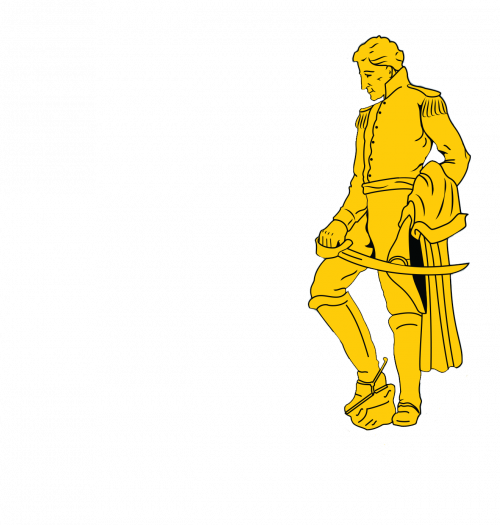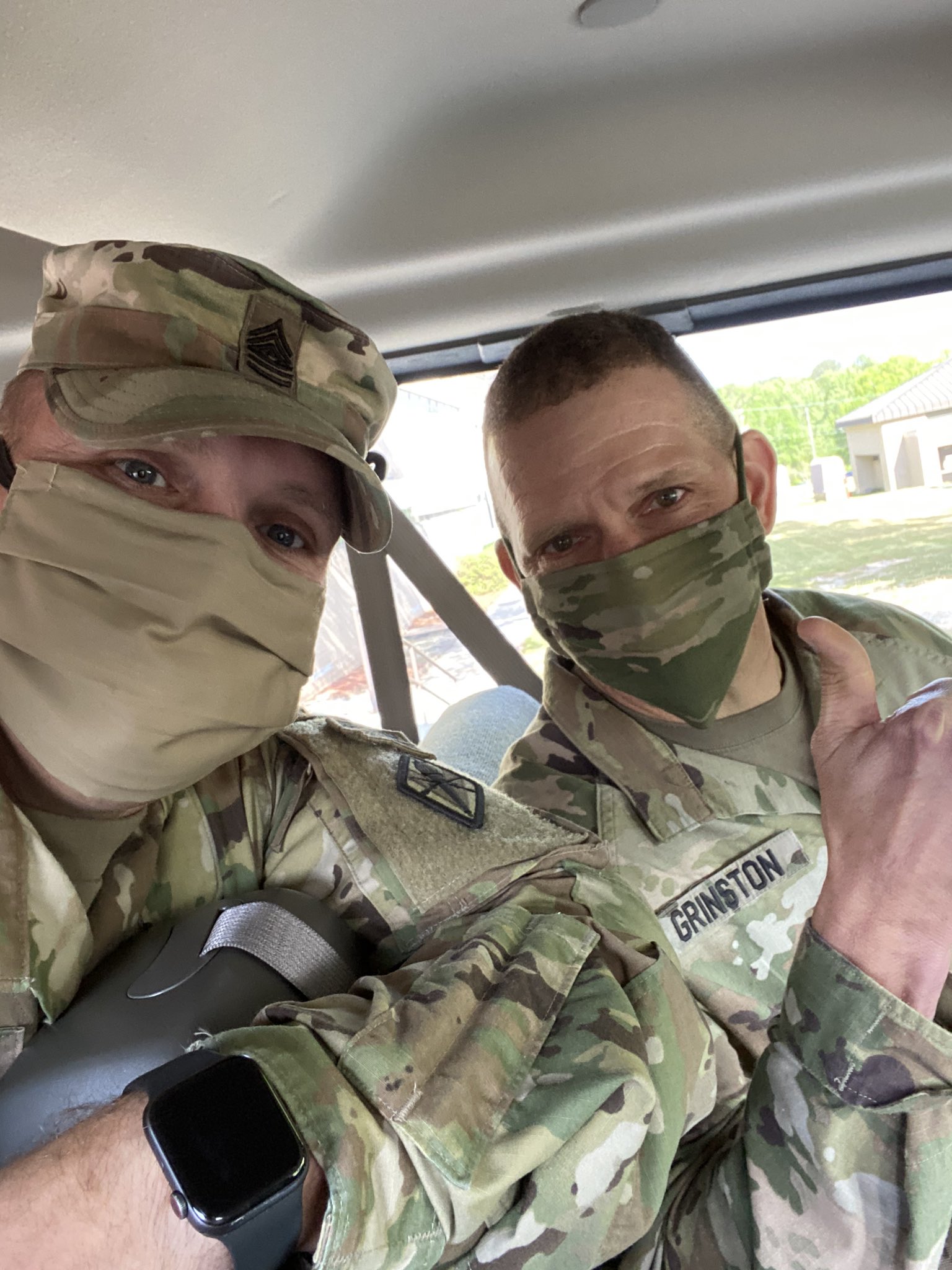Sgt. Maj. of the Army Michael A. Grinston and Post Command Sgt. Maj. Jerimiah Gan demonstrate how to wear face coverings if social distancing cannot be maintained. Military personnel may wear civilian face masks as long as they are black, brown, white, OCP pattern or ACU pattern, if medical face masks are not available to be worn. (Photo by Post Command Sgt. Maj.Jerimiah Gan)
By Alexandra Shea Fort Jackson Leader
U.S. Army Training Center and Fort Jackson Commander Brig. Gen. Milford “Beags” Beagle Jr., continued to keep the extended Fort Jackson Family updated about COVID-19 changes to the installation during a virtual town hall April 9.
It was the eighth weekly town hall held so far. Another is scheduled for April 16 at 3:30 p.m.
“There is a lot of fear, anxiety and stress out there today not only here at Fort Jackson, but across our country,” Beagle said. “We want to reduce that fear and stress by doing our part to let you know what and how we are doing.”
Beagle started the town hall with recent changes to installation operations to help fight the spread of the virus that included reducing training loads by 50% through temporary suspension of shipping new trainees to Basic Combat Training; enforcing social distancing for Soldiers, civilians and trainees; changes in the delivery of beneficiary services; and the wearing of face protection by installation personnel, trainees and Soldiers.
“Protecting the force is our number one priority,” Beagle said. “We protect the force to protect our mission.”
Some of the changes, such as having beneficiary services by appointment or virtually, help reduce exposure to Soldiers, trainees and others from those who may carry the virus but show no symptoms.
The largest change to operations came as Beagle announced modified installation access to retirees and other beneficiaries. Since April 6, retirees and beneficiaries can access the installation on Tuesday and Friday to shop at the Commissary and The Exchange.
These beneficiaries will also receive health care pharmacy support at the Moncrief Medical
Home located outside the installation. Retirees, active duty service members and their families who reside on the installation will continue to receive their health care at the Moncrief Army Health Clinic.
“We have not changed the service we offer,” said Col. Chad A. Koenig, Moncrief Army Health Clinic commander. “We changed how we offer them.”
Koenig also announced the arrival of COVID-19 testing equipment to Moncrief Army Health Clinic.
This allows testing to be conducted at the clinic instead of shipping samples to a local testing facility.
The arrival of the testing capabilities will reduce the time results will be received by medical professionals and patients.
“We have now come online in a limited capacity to test in-house for COVID-19,” Koenig said. “We can now get same day (results) for scenarios where we need to get results as fast as we can.”
The Exchange and Commissary have posted modified hours to allow staff to restock and disinfect the facilities to reduce virus exposure to customers.
Commissary store hours are 7:30 a.m. to 8 p.m. Tuesday through Friday, 9 a.m. to 8 p.m. Saturday, 11 a.m. to 6 p.m. Sunday and closed on Monday.
Retirees and beneficiaries 65 and older, as well as those who are medically immunocompromised, will continue to have priority shopping hours from 7:30 a.m. to 9:00 a.m. on Tuesdays and Fridays to further reduce risk. Retirees and their beneficiaries living on post will have daily commissary access. Active duty beneficiaries, who are immunocompromised, will continue having priority shopping the first open hour every day, while all other active duty service members and their beneficiaries will have daily access during normal operating hours. Please visit the Fort Jackson mobile app and the COVID-19 Prevention and Updates page for a more detailed listing.
The Exchange hours are now 9 a.m. to 7 p.m. Monday through Friday and 11 a.m. to 7 p.m. Saturday and Sunday.
“So where do we need your help?” Beagle asked. “The keys to our success is compliance. A lot of times it feels like our rights and privileges are being taken away, but everyone has to play by the same rules. There are things that we are going to have to do to bend the curve across the board.”
Beagle said complying with new installation measures, social distancing and following stay-at-home orders will help significantly reduce the spread of the virus as well as the time it will take for pre-virus activities can continue.
Fort Jackson also announced that as of April 10, the wear of face protection while in “public” buildings on Fort Jackson was mandatory. Otherwise, face masks are only required to be worn when social distancing cannot be maintained (six feet of space in between people).
Military personnel may wear civilian face masks as long as they are black, brown, white, OCP pattern or ACU pattern, if medical face masks are not available to be worn. Masks cannot be made from ACUs due to chemicals imbedded in the material. No logos, phrases, may be worn. Civilian employees, contractor employees, and all other personnel should also adhere to Center for Disease Control guidelines for the wear of purchased or self-made civilian masks when on Fort Jackson, if medical face masks are not available to be worn.
As the town hall came to a close, questions from Facebook users were answered by Beagle and fellow top installation leadership.
The top question asked included whether trainees will able to return home before attending Advanced Individual Training, and if they would need to self-quarantine upon their return home.
“A Soldier returning home after Basic Combat Training is rare and mostly pertains to Reserve and National Guard Soldiers on a split-option,” Beagle said.
A split-option contract for U.S. Army Reserve and National Guard Soldiers means the Soldier will attend BCT then return home for a period of time before attending AIT. Soldiers with contracts such as these are often students who attend BCT and AIT during spring and summer breaks from school.
Additional questions were addressed by the installation’s top leaders during the town hall. Family members of trainees who missed the town hall were encouraged to follow Fort Jackson and Beagle’s Facebook page to watch the town hall as well as prior town halls to understand changes that happen on the installation during the COVID-19 pandemic.
Updated information can be found on the Fort Jackson COVID-19 web page at: https://home.army.mil/jackson/index.php/about/COVID-19-Prevention-and-Updates.
“Please continue to practice social distancing and hand washing,” Beagle said as he closed the town hall. “I appreciate you tuning in with us and keeping yourself informed.”
The town halls are streamed live on the Fort Jackson Commanding General Facebook page.






